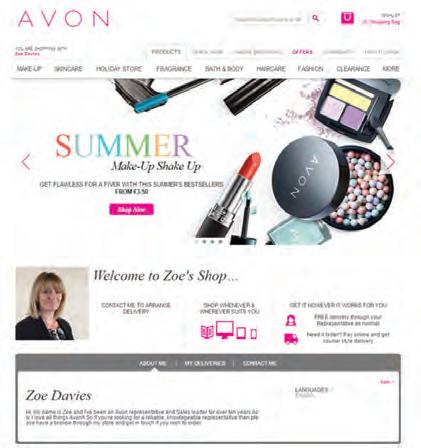
14 minute read
The Direct Approach
Winning Edge examines the growth in size and professionalism of the global direct selling industry
ANDY SMITH
Advertisement
UK and Ireland general manager at Amway
“Direct selling offers the opportunity to try out a new career channel without having to risk your livelihood”
Mother of two, 36-year-old Kiran Khutan, has been working as her own boss selling Amway products for four years. With a background in marketing, she worked evenings and weekends to build her own business, initially as a sideline to her full-time job for a London insurance company.
This is the image of the direct selling industry that we’re all familiar with: people, mainly women, earning a little money on the side by selling products to family and friends, and friends of friends. And, to an extent, this is the reality. Nine out of ten of the 103 million individual direct sellers worldwide are involved on a part-time basis, and at least 80% are women.
GLOBAL GROWTH Yet this is no cottage industry. Globally, reports the World Federation of Direct Selling Associations (WFDSA), sales rose 7.7% in 2015 to $183.7bn, up from $170.6bn in 2014. Every region increased sales last year, with 80% of countries reporting a rise in sellers and sales.
This is sustained growth, not a flash in the pan. In Europe, direct selling has shown constant expansion over five years, with EU sales rising by 7.5% in the year to 2015 – a sharp contrast with average retail sales in the EU, which grew by just 3% in the same period. Even during periods of economic turmoil, direct selling seems to flourish.
As Katarina Molin, executive director of SELDIA, the European Direct Selling Association, explains, “Many of the products sold this way do
DIRECT SELLING: A DEFINITION
l Direct selling is defined by SELDIA (European Direct Selling Association) as “a method of marketing and retailing goods and services directly to consumers, in their homes or in any other location away from permanent retail premises. It is usually conducted in a face-toface manner – either where products are demonstrated to an individual or group, or where a catalogue is left with the consumer and the direct seller calls back later to collect orders. Unlike direct marketing or mail order, direct selling is based principally on personal contact with the customer.”
not necessarily suffer from a downturn in consumer demand. In particular, this is true of personal care, nutrition, health and wellbeing products, which have experienced an upwards sales trend in the last couple of years.”
ENTREPRENEURSHIP Another positive factor is the rising trend towards entrepreneurship. “The number of private entrepreneurs has significantly increased due to the digitisation of the economy and the rising demand for more job flexibility,” continues Molin.
Amway is the world’s biggest direct selling organisation (see box on page 30), operating in 100 countries and territories. With 20,000 employees globally, it is one of the 30 largest private US companies and it is estimated that 71 million households have an Amway product. UK and Ireland general manager Andy Smith, also chair of the UK’s Direct Selling Association (DSA), explains the appeal of the industry in today’s uncertain economic climate. “Direct selling offers the opportunity to try out a new career channel without having to risk your livelihood.



MICHAEL CERVELL
senior vice president, global direct sales at Oriflame
“Direct selling in China was initially like the Wild West. Now it’s a highly regulated but fast-growing industry”
The Amway business opportunity is highly attractive because it can be practised independently and alongside another career. This makes it a perfect second source of income.” Of the 40,000 Amway distributors in the UK and Ireland, Smith estimates that only 10% work on Amway full-time.
NEW FRONTIERS As in so many other industry sectors, growth also comes from China, which is soon likely to eclipse the US as the world’s biggest direct selling market. This is no mean feat given that direct selling has its origins in the US, as long ago as the mid-19th century, and is firmly ingrained in the culture there. In contrast, direct selling was banned in China between 1998 and 2006 after a spate of pyramid selling scams. Since then, the industry has been heavily regulated, although the Chinese government continues to issue new licences.
Michael Cervell, senior vice president, global direct sales for Oriflame, which sells personal care, accessories and nutritional products, names China as one its fastest growing markets, along with Indonesia, Turkey, Mexico and Peru, among others. “Direct selling in China was initially like the Wild West. Now it’s a highly regulated but fast-growing industry.” He points out that direct selling companies are still required to have a physical store within their operating area – during the ban on direct selling, these stores became the only way to maintain links with customers.
Amway is among those to open physical stores in key markets, though the emphasis is on providing a
TOP 10 DIRECT SELLING COMPANIES
1 AMWAY (2015 revenue: $9.5 billion; global headquarters US) Established 1959. Principal product lines: skincare, haircare and cosmetics, homeware, nutritional supplements and domestic cleaning products. 2 AVON+ ($6.16bn; UK) Established 1886. Skincare, haircare, personal care and cosmetics, fragrance, fashion and homeware. 3 HERBALIFE ($4.47bn; US) Established 1980. Nutrition, weight management and personal care. 4 VORWERK ($4bn; Germany) Established 1883. Household appliances, fitted kitchens and cosmetics. 5 INFINITUS ($3.88bn; China) Established 1992. Health and nutrition. 6 MARY KAY ($3.7bn; US) Established 1963. Cosmetics and skincare. 7 PERFECT ($3.58bn; China) Established 1994. Health food, cosmetics, personal care, skincare and household. 8 NATURA ($2.41bn; Brazil) Established 1969. Cosmetics, skin care, personal care, hair care, fragrance, household and solar filters. 9 TUPPERWARE ($2.28bn; US) Established 1946. Food preparation, storage and serving solutions; cosmetics and personal care. 10 NU SKIN ($2.25bn; US) personal care and nutrition.
Source: Direct Selling News 2016 DSN Global 100
New digital platforms offer customers convenience
with a personal touch (Image courtesy of Avon)

showroom – or “experience centre” – for sellers to demonstrate products, and most sales at Amway stores are to distributors. Oriflame has a concept store in Stockholm, “but it’s not a core part of our strategy,” explains Cervell. “We want our products in the hands of our consultants.”
China is not the only market on a steady growth curve. Angela Cretu has been Avon Turkey group vice-president with responsibility for Turkey, Africa and the Middle East for two years, looking after Russian and Eastern European markets before that. “As these markets are still developing, there are no ingrained habits around where people shop, and they are used to change,” observes Cretu. “There are clearly cultural differences that need to be taken into account, but these areas have tremendous potential.”
She continues, “Take North Africa and the Middle East – in both markets, at least 65% of women don’t have a job. In Saudi Arabia women can’t have their own bank account. But these are affluent markets undergoing massive economic growth. Women here are big consumers, and have a rich social life, with large families and a large network of friends to sell to.”
Cretu describes the industry as being “at the cusp of a new frontier”.
SOCIAL REVOLUTION Avon’s Cretu is not alone in her assessment. New technologies and the rise of social media make it easier to sell in these markets, but are causing seismic shifts across the whole industry.
Alan Luce, a veteran direct seller who consults with more than 100 direct selling companies as senior managing principal at US-based Strategic
Choice Partners, talks of “tectonic plate shifts” in today’s industry. “We’re at an interesting transition point, where traditional and online direct selling are converging,” he says. “What today’s successful operators all share is the recognition that customer expectations have changed radically in the last five years. Face-to-face contact isn’t any less important, but the new downtown is no longer the local pub, but Facebook.”
Luce continues: “People expect to be able to replicate online everything they can do in person. Today’s customers expect instant gratification, and direct sellers are having to adapt their business models to cater for these changing expectations. If customers can’t buy from you in the way they want to, they will never sell for you.”
Oriflame’s Cervell agrees: “Customers are not comparing us with other direct selling companies; they’re comparing us with Amazon and Uber. In the past our industry has been too inward looking and now we need a broader view.”
To that end, Oriflame, Avon and some other direct sellers have developed online shopfronts for individual sellers under their umbrella, where customers benefit from the convenience of buying online, while maintaining the face-to-face relationship with their seller; the back-end of the site, including the financial transaction, is hosted by the company.
Andrea Slater, Avon’s general manager for Western Europe, comments, “Our research showed that 76% of shoppers would rather buy from an independent local business than a big brand, if prices were comparable.” She describes Avon’s new digital platform as “a perfect marriage of offline and online shopping, giving customers the convenience to shop whenever they want, but with a personal touch”. The new website allows customers to shop online directly through a local independent business – their representative’s own store. This model is being rolled out gradually across Avon’s markets.
Social media platforms also offer an easy way for sellers to communicate with customers, and even to host virtual parties. “When I was chairman of SimplyFun [a seller of children’s educational games], we pioneered virtual parties,” says Luce. “And we got more bookings for physical parties through these virtual parties than we achieved from physical parties.”
PROMOTING PROFESSIONALISM The UK’s DSA and other industry bodies are striving to raise the profile of the direct selling industry and protect the interests of their members and consumers through improved training and professional development. The International Direct Selling Educational Institute (IDSEI), for example, says training will: l Provide adequate information and knowledge to direct selling teams on what’s hot or new in the direct selling industry l Prepare team members for hard to please clients l Enhance selling techniques l Motivate direct sellers to work at their fullest selling potential.
IDSEI notes: “Training your direct selling teammates can come in various forms like one-onone meetings, weekly updates to check on each individual’s selling progress based on sales reports, online conferences done through online chats, and video calls or emails to remind them what to do.”
One of the key challenges facing direct sellers is that, once they target buyers beyond friends and family, they find they lack the selling skills to present their products effectively and often give up. Leigh Walton, a UK-based direct selling trainer and author, says: “Education starts as soon as someone joins your business. Whether joining a ‘social selling’ or ‘traditional’ business, people need an induction on how the business works and what they need to do.
“From there on a step-by-step approach is needed; your job, as their manager or team leader, is to check that they are receiving training and understand what they need to be doing to ensure success. Don’t assume that because you have told someone ‘how’ to sell, ‘how’ to generate leads, and ‘how’ to place an order, that they know how to do it.”
Walton adds: “What is important to remember is that before somebody has done an activity they will need teaching or training on how to do it, and afterwards they need coaching – so that they can improve and become more skilled.”
Technology is increasingly helping companies up their game internally by providing online business tools, including online catalogues,
TOP 10 MARKETS FOR DIRECT SELLING
Country 2015 retail sales ($US) 3-year compound annual growth
US China Korea Germany Japan Brazil Mexico France Malaysia UK
$36.12bn $35.46bn $16.89bn $15.19bn $14.66bn $9.13bn $6.93bn $4.59bn $4.44bn $4.04bn 4.5% 22.5% 7.5% 5.2% -0.7% 2.1% 4.7% 2.5% 9.4% 9.8%
Source: World Federation of Direct Selling Associations
team-tracking software and, crucially, training via e-learning, webinars and mobile apps.
“We have more than 600,000 people on our e-learning platform,” says Oriflame’s Cervell, “and our sellers can watch tutorials lasting just a few minutes on their mobile phone, maybe while waiting for a tube home.”
Avon’s Cretu agrees: “People no longer have the patience for a two-hour classroom-based session; they want five or ten-minute video briefings.”
Lynda Mills, director general of the UK’s DSA, adds, “The Internet makes it easier to educate and raise awareness, and to position the whole industry in a reputable way.”
ETHICAL SELLING Every national direct selling association requires member companies to follow the standards of its code of conduct, and leading players have worked hard to ensure the highest standards are enforced from the top down. In Europe, national codes of conduct are based on SELDIA’s code of conduct, which sets out to ensure that the relationships between companies, direct sellers and consumers are based on trust and fairness.
“Serious companies have strict rules and enforce them without hesitation,” observes Hakki Ozmorali, owner of DS Consulting and editor of the industry news site, World of Direct Selling. “Self-regulation is always less costly than the price of non-compliance.”
Ayo Olaseinde is UK president and EMEA senior vice-president of SaladMaster, which sells nutritional cooking systems. Winner of the 2015 DSA’s Leadership Award, he believes that training and personal development are key to maintaining the highest standards. “To earn more, you have to learn more. If you build your sellers’ confidence, that leads to better communication. People often come to direct selling without a sales background, and so we make sure that everyone, from the top down, adopts the same standards.”
SaladMaster is in the minority of direct selling companies in that it doesn’t follow the multi-level marketing (MLM) business model. This sees individual direct sellers given the opportunity to build their own sales teams. In doing so, they receive commission not only on their own sales, but on the sales by those they have recruited, trained and motivated.
SELDIA’s Molin says this isn’t a business model that should be viewed with scepticism. “This compensation is derived only from product sales and not merely from introducing other people,” she emphasises. “Pyramid schemes, which focus exclusively on, and compensate for, recruiting, are illegal.” World of Direct Selling’s Ozmorali agrees that, operated correctly, there is nothing negative let alone unethical about the MLM model. “Compensating direct sellers against the sales made by others who ISM PROFESSIONAL SALES CERTIFICATION were recruited by those direct sellers is, in essence, delegating the l The Institute of Sales Management (ISM), the only industry body approved to deliver Ofqualregulated sales qualifications and a member of field management to the the Federation of Awarding Bodies, has field itself. This is a developed ISM Professional Sales Certification, strategic business a competencies-rich framework for cultivating choice,” he says. a salesperson’s skills, enhancing continuous
Luce points out that professional development (CPD) and building a long-established rewarding career path (see page 6). companies in the l Professional Sales Certification recognises industry have operated sales competence and professionalism, with the for decades without any potential to have a major impact on direct black marks against them, enjoying a sterling reputation with consumers and regulators. “How have they achieved this?” he asks. “Through company sellers, enabling them to demonstrate high standards publicly, and differentiate themselves from competitors who don’t care about knowledge, skill and ethical behaviour in sales. l Jack Mizel, chief executive of the ISM, says, “Direct sellers may be independent, selfemployed consultants, but selling skills, such as lead generation, cold-calling, overcoming culture. If you have a objections, communication, negotiation and salesforce that presentation skills, remain vital to their role. consistently ‘colours We see training, qualifications and recognition outside the lines’ when it through ISM Professional Sales Certification as comes to ethics, you an important step in addressing the issue of don’t deserve to be in improving the core sales skills of direct sellers.” business. Many multilevel marketing companies have never had a single regulatory challenge, because they will not tolerate any colouring outside the lines.”
He adds, “And it’s easier to monitor than ever, because of social media. Whether you’re a start-up or a multi-billion dollar company, you have the ability to monitor your salesforce and ensure they are following company guidelines.”

EXCITING TIMES This transparency, and the sophisticated online channels being adopted in direct selling, suggest a strengthening industry in both new and established markets. “This is one of the most exciting times for direct selling in the last 30 years,” says Luce. “Generically, it may have had negative associations, but the individual brands have very positive associations. Research has shown that nearly 70% of households have purchased this way in the past, and would do so again.”
And let’s not forget individual sellers. The interest in entrepreneurship is not going to die down any time soon, says SaladMaster’s Olaseinde, who is evangelical about the potential for those entering the industry. “I left school without qualifications and worked in a bread factory – now look at me! Direct selling turns ordinary people into extraordinary people. There are no limits to what you can achieve.”
AYO OLASEINDE
UK president and Europe, Africa and Middle East senior vice-president of SaladMaster










